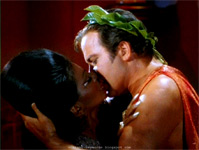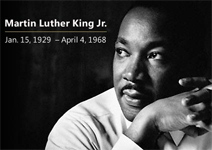 Science fiction has a long history of presenting us with new and progressive ideas, from free love in Stranger in a Strange Land to some commanding women characters in the recent Battlestar Galacitca, but probably the most famous progressive moment in SF was when midway through Star Trek’s third season, Lieutenant Uhura kissed Captain Kirk in America’s first televised mixed-race kiss.
Science fiction has a long history of presenting us with new and progressive ideas, from free love in Stranger in a Strange Land to some commanding women characters in the recent Battlestar Galacitca, but probably the most famous progressive moment in SF was when midway through Star Trek’s third season, Lieutenant Uhura kissed Captain Kirk in America’s first televised mixed-race kiss.
But it almost wasn’t didn’t happen.
At the end of the first season, actress Nichelle Nichols was about to return to her roots of singing on stage. Her appearance in Star Trek had significantly raised her visibility, and she was ready to start on Broadway, her greatest aspiration as a singer. This was her big break.
So one Friday afternoon after production had wrapped for the season, she went to Gene Roddenberry’s office, explained the situation, and handed him her resignation. He told her she couldn’t possibly leave, that he desperately needed her to stay on the show. “Don’t you understand what I’m trying to do here?”
She was not swayed, but she agreed to think about it over the weekend.
The very next night, she was on stage for an NAACP fundraiser. Afterwards, one of the organizers asked her if she would be willing to meet a fan. She agree, expecting the typical Trekkie of the era, but much to her surprise, it was Martin Luther King. “I’m the fan,” he said. “I’m your best fan. I am your biggest fan.”
Ms. Nichols was flabbergasted, amazed that such an important figure as Dr. King even knew who she was, let alone watched the show, but he was clearly not faking it. He went on about what an important role model she was, since she was one of the first black women to appear on screen as anything other than a servant or entertainer. Eventually, she managed to find her voice, thanked him, and mentioned that she was going to miss it since she was going back to her singing career in the next year.
 Shocked, Dr. King would not allow this. “STOP! You cannot! You cannot leave this show! Do you not understand what you are doing?! You are the first non-stereotypical role in television! Of intelligence, and of a woman and a woman of color! That you are playing a role that is not about your color! That this role could be played by anyone? This is not a black role. This is not a female role! A blue eyed blond or a pointed ear green person could take this role!
Shocked, Dr. King would not allow this. “STOP! You cannot! You cannot leave this show! Do you not understand what you are doing?! You are the first non-stereotypical role in television! Of intelligence, and of a woman and a woman of color! That you are playing a role that is not about your color! That this role could be played by anyone? This is not a black role. This is not a female role! A blue eyed blond or a pointed ear green person could take this role!
“Nichelle, for the first time, not only our little children and people can look on and see themselves, but people who don’t look like us, people who don’t look like us, from all over the world, for the first time, the first time on television, they can see us, as we should be!
“As intelligent, brilliant, people! People in roles other than slick tap dancers, and maids, which are all wonderful in their own ways, but for the first time we have a woman, a WOMAN, who represents us and not in menial jobs, and you PROVE it, this man [Gene Rodenberry] proves and establishes a precedent that validates what we are marching for because three hundred years from today there we are, and there you are, in all our glory and all your glory! And you CANNOT leave!”
Clearly, Dr. King was more persuasive than Gene Roddenberry had been, and she decided to stay. On Monday, she went back to Gene’s office as asked if the part was still available. Of course, it was. He had already torn up her letter of resignation.
Relieved, she told him what Dr. King had said to her. He listened quietly, and finally replied, “Thank God someone understands what I am trying to achieve.”
And apparently it made a difference. Numerous African-Americans at NASA point to Lt. Uhura as their reason for getting involved in space exploration. Even Whoopi Goldberg credits the Uhura character for her wanting to be on Star Trek:TNG.
We’re still a long way from the ideals of Dr. King’s dream or Roddenberry’s federation, but since today we celebrate Dr. King’s birthday, I thought I would point out that every little bit helps.
